|
SUPPLEMENT
No. 46November 28,
2020
Uphold the Hereditary Rights of
the Indigenous Peoples!
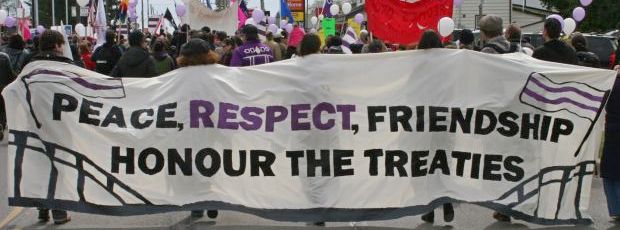
(D. Kellar)
Say No! to
Criminalization of Six Nations Land Defenders
• Court
Injunctions
Will Not Deter the Haudenosaunee from
Affirming Their Sovereignty
- Philip Fernandez -
• Colonial Logic Behind Legal
Reasoning
• Open
Letter from Williams Family
• Statement
from
Concerned Haudenosaunee Women Regarding
Injunctions at 1492 Land Back Lane
All Eyes on Mi'kma'ki
• Mi'kmaw
People
Expand Moderate Livelihood Lobster Fishery
- Sarah Mullgrave -
• Sale
of Clearwater Seafoods
Say No! to Criminalization of Six
Nations Land Defenders
- Philip Fernandez -

Land defenders from the Six Nations of the Grand
River (Haudenosaunee) in Caledonia, about 100
kilometres south west of Toronto, stopped
construction on the McKenzie Meadows housing
development on July 19, 2020 and reclaimed the
land as unceded Haudenosaunee territory. They
renamed it 1492 Land Back Lane and have remained
on the land to assert their sovereignty despite
escalating Canadian state violence.
The land defenders have been occupying the
property to stop a land development for which
there is no free, prior and informed consent from
the Haudenosaunee. The occupiers believe that were
the developer to proceed with the development that
would effectively destroy the ability to resolve
the underlying dispute over the lands. Foxgate
Development Inc. had originally applied for an
injunction at the Ontario Superior Court ordering
that the land defenders be removed. On July 31, an
interim injunction was granted by Justice John R.
Harper. On August 25 the injunction was upgraded
from temporary to interlocutory, a stronger type,
and on October 22 the injunction was made
permanent. Justice Harper granted the injunction
without hearing any evidence from the
Haudenosaunee with respect to their land claim.
Reporting on the October 22 hearing for APTN
News, Brett Forester explained that the person the
court had named the sole leader of the occupation
and the defendant in the case, Skyler Williams,
attempted to put forward a constitutional question
and asked that the provincial and federal Crown be
named as third parties to the hearing.
Williams filed an affidavit on October 20 in
which he argued that the Crown, not him, should be
liable for damages for failing in their duty to
consult with the community regarding development
of the disputed land. The affidavit said, "The
claim is that the Crown is liable for those and
any other damages due to their negligence in
failing to ensure that the Duty to Consult was
fulfilled on lands known to them to be
legitimately contested by the people of Six
Nations."
The judge refused to hear the argument, finding
Williams in contempt and therefore not "allowed to
participate." He said "Any material pleadings that
he has filed -- which I have not seen, but I
understand that he's filing a statement of defence
and a counter claim -- that they will be struck."
Earlier, when deciding on the interlocutory
injunction, Justice Harper had used a three part
test -- called the RJR MacDonald test. After
considering whether Foxgate's case had merit, he
decided whether the harm caused by not granting
the injunction would be irreparable. He ruled that
these standards were met and considered who would
be harmed the most if the injunction was granted
-- a consideration called the balance of
convenience. One would think that this would lead
to a determination in favour of the Indigenous
people, those who have a land claim, as developing
the land would effectively eliminate their just
claim. However, as a 2019 study by Indigenous
thinktank the Yellowhead Institute highlights, 81
per cent of injunctions sought by corporations and
private interests against Indigenous people
defending land claims are granted by Canadian
courts, as was the case with the injunctions
granted to Coastal GasLink against the
Wet'suwet'en in northern BC, for example.
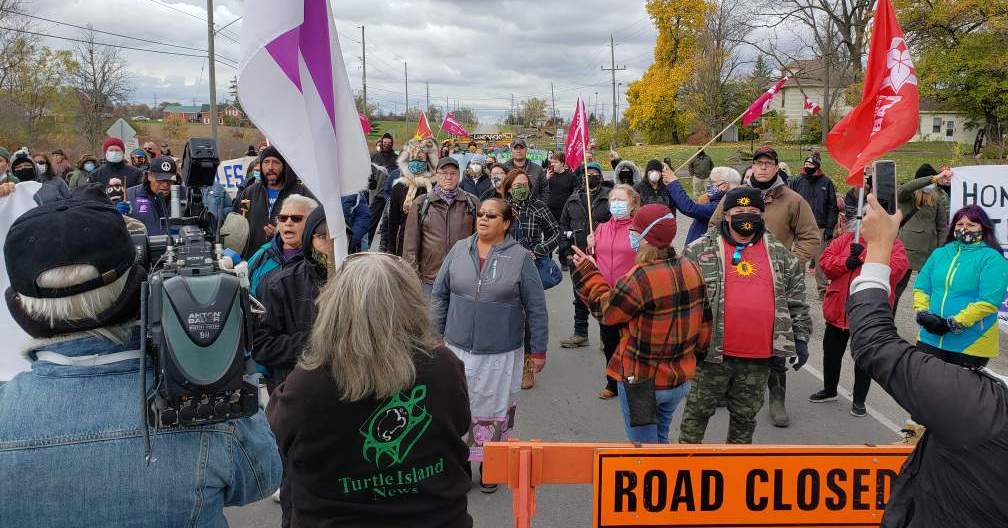
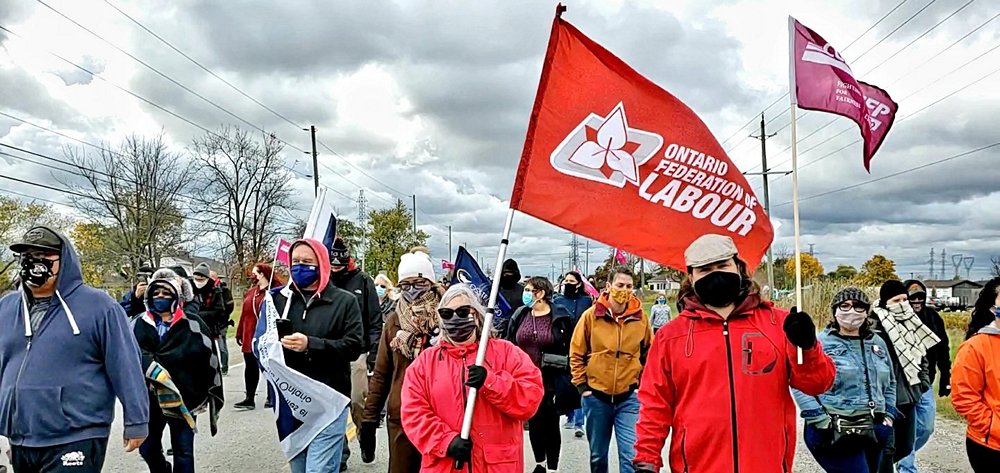
October 25, 2020. Delegation from the Ontario
Federation of Labour and the Canadian Union of
Public Employees-Ontario join the land defenders
in Caledonia.
According to a report in the Hamilton
Spectator on October 29, the McKenzie
Meadows subdivision was to be the "first phase of
a much bigger housing development that would
extend to the border of the Six Nations of the
Grand River, the biggest First Nations reserve by
population in Canada." Despite attempts by Foxgate
to win support for their development it is opposed
by the vast majority of the people living on Six
Nations territory. On August 15 the hereditary
chiefs stated: "The Haudenosaunee Confederacy
Chiefs Council is opposed to this development and
as the holder of collective rights for the
Haudenosaunee people has not granted any type of
consent which would allow this development to
proceed."
The just struggle of the Haudenosaunee land
defenders has been met by state violence of the
police, courts and government. To date, 33
Haudenosaunee and their allies have been arrested
and criminally charged including on August 5 when
more than 100 fully armed OPP invaded sovereign
Haudenosaunee territory, using tasers and rubber
bullets against the land occupiers. Reinforcements
from the community forced the OPP to retreat.
Those arrested appeared in court on November 25 to
face criminal charges but their cases have been
postponed to January 12 at the request of the
defence to allow more time for consultation and
preparation with the accused.
Premier
Doug Ford criminalized the land defenders during an August 6 press
conference following the OPP paramilitary assault against the land
defenders when he said: "You know, you just can't go in and just take
over people's future homes, it's wrong. And then, when the police
come... they get an outhouse, toss it over from a bridge onto a police
car, then they start throwing rocks at the police car! Like, enough is
enough ... people have to obey the rules. I don't care where you come
from, you know, what your race, creed, colour, whatever, we have one
country, one rule, and that is it!" For its part, the Trudeau
government has taken no steps to intervene to assist the Six Nations
nor to engage in meaningful discussions to come to a peaceful
resolution of this struggle.
The Ontario Superior Court hearing regarding
Foxgate's application for a permanent injunction
against the land defenders began in Cayuga,
Ontario, on October 9. At the hearing, Skyler
Williams, who, on the basis of his Facebook
postings, was declared by the court to be the
leader of the land defenders, asserted in an
affidavit: "I am a Haudenosaunee man who does not
belong before this colonial court. As a Mohawk of
the Wolf Clan and of the Haudenosaunee
Confederacy... I believe and follow the Great Law
of Peace." When, in the course of the hearing,
Williams agreed that he had indeed defied the
injunction, presiding Judge Harper was "astounded"
and arrogantly lectured Williams, saying: "It
is not an option to take the law into your own
hands, to occupy others' lands."
"Others," notably the Canadian state and private
interests, in fact have been stealing and
occupying Haudenosaunee lands for almost 250
years. The Haldimand Treaty of 1784 granted the
Haudenosaunee 950,000 acres "six miles deep" on
both sides of the Grand River for their use and
the use of their descendants in perpetuity. This
was to compensate the Six Nations for the loss of
their traditional territories, a consequence of
their fighting as allies on the losing British
side in the American Revolutionary War. This land
has since been reduced to less than 47,000 acres
today (see map below).

There are currently more than 30 outstanding land
claims with more on the horizon as the
Haudenosaunee continue their historical research
on lands they lost through government land-grabs
and other illegal means. From the beginning, the
Canadian state, as representative of the Crown,
has refused to prohibit the building of towns and
cities on these lands without the approval of the
Haudenosaunee.
In 2006, the Haudenosaunee successfully reclaimed
another private housing project, the Douglas Creek
Estates (DCE) subdivision, renaming it
Kanonhstaton, Mohawk for "The Protected Place."
Canadians stood shoulder to shoulder with the
Haudenosaunee land defenders in 2006, as they do
again today. The camp established by the
Haudenosaunee land defenders today is across the
road from Kanonhstaton.
The violence and perfidy of the racist Canadian
state against the Haudenosaunee is longstanding
and includes the forcible removal of the
Confederacy Council from its offices in 1924 by
the RCMP, shortly after which government officials
set up a band council under the Indian Act in an
election in which only a small number of people
participated.
In a post on his Facebook page on November 25,
the 130th day of the land claims fight, Skyler
Williams noted: "Despite the number of days we are
just as determined as ever to keep moving forward.
Keep on building and growing. So much has been
stolen. This is the line too far. Our community
will not be hemmed in. We will not stand by and
continue to watch as our lands are stolen or let
our nations be divided. Federal and provincial
governments still after all this, continue to drag
their feet. Leaving this in the hands of the OPP
is absolutely unacceptable. We have been ready to
start this dialogue. There is no reason this
didn't start months ago. Yet here we are still
waiting with the threat of the OPP ever present."
Everyone is invited to visit the land defenders
at their camp and even stay overnight to show
their support. Those who can are urged to
contribute to the 1492 Land Back legal fund here. Contributions can also be made to the functioning
of the land defenders' camp with an e-transfer to
landback6nations@gmail.com. Already more than
4,500 people across Turtle Island have donated
close to $360,000 in a campaign to raise half-a-million dollars for legal defence, a measure of
the level of support for the just stand of the
Haudenosaunee.
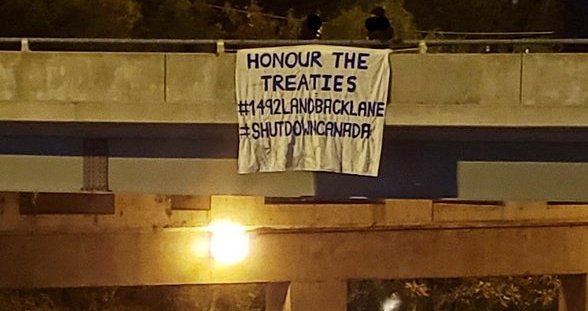
October 25, 2020. Banner hangs from overpass on
Highway 403 in Hamilton.
Hands Off the Haudenosaunee!
Uphold Indigenous Sovereignty!

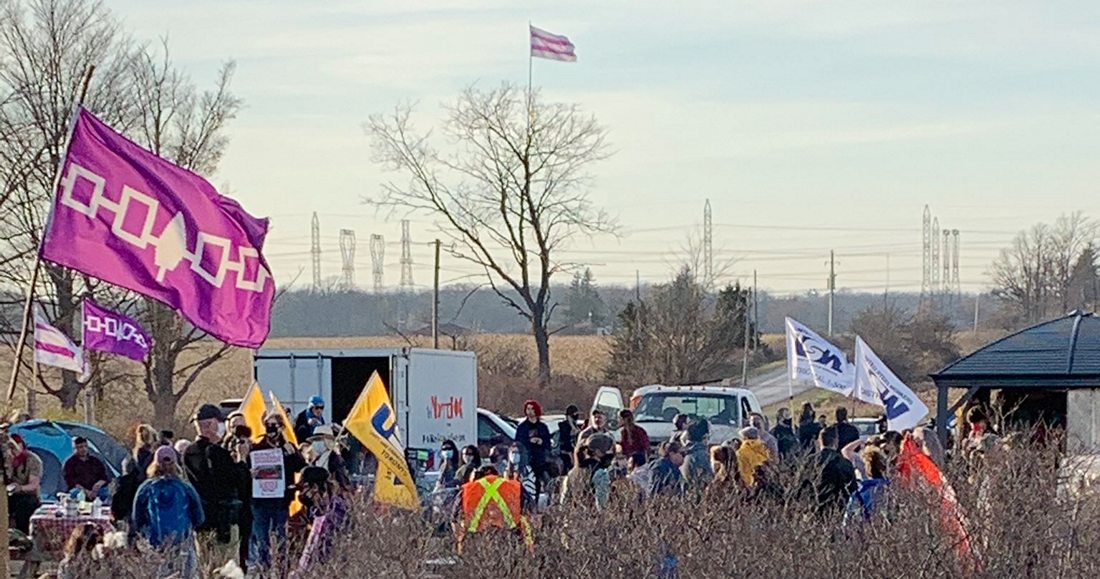
Karl Dockstader, a member of the Oneida Nation of
the Thames, journalist and co-host of Niagara's
CKTB 610 AM radio program "One Dish, One Mic,"
provides the following background to the court
case of the Haudenosaunee people, 1492 Land Back
Lane and the colonial theft of their lands on the
Grand River.
"The legal reasoning that Justice Harper is using
to soften the balance of convenience conditions in
favour of the developer is based on the comments
of Justice Robert J. Sharpe in a 2019 Canadian law
book: 'Property rights are sacrosanct...the
balance of convenience and other matters may have
to take second place to the sacrosanctity of
property rights in matters of trespass.'
"Indigenous rights are protected by the Canadian
Constitution. Canadian property rights are not
protected by the Constitution of Canada, but they
are considered so central to the Canadian sense of
identity and wealth that they experience strong
protection.
"This is not a precedent being set. The Canadian
sacrosanctity of property rights has been given
such weight in injunctive relief hearings that it
regularly outweighs the other considerations of
the tripartite interlocutory injunctive relief
test. The standard for a permanent injunction is
different.
"A permanent injunction [...] is effectively the
court determining if the land belongs to the
developer.
"Justice Harper named Skyler Williams as the sole
leader of the 1492 Land Back Lane defence -- to
the objection of Mr. Williams -- and ordered him
to have the land vacated. Justice Harper will not
hear any underlying constitutional arguments
unless the disputed property is vacated by the
Haudenosaunee people and their supporters, he
stated in court.
[...]
"Court, Conflict and 'Reconciliation'
"This year high profile Indigenous rights cases
stemming from a historical Sipekne'katik court
victory and a historical Wet'suwet'en court
victory have been in the news for not having those
court rulings result in legislation or policy that
implements the rights affirmed in the cases. The
Mi'kmaw fishers and the Wet'suwet'en people
engaged in the formal court processes, achieved
some level of success in the court system, only to
still have their rights effectively thwarted.
"British Columbia Supreme Court Justice
Marguerite Church granted Coastal Gaslink a
temporary injunction to remove Wet'suwet'en land
defenders in 2018. After six months of
consideration Her Honour ruled in 2019 to upgrade
the injunction from interim to interlocutory.
Justice Church gave a narrow consideration to
Indigenous law, and specifically said a blockade
was not a traditional practice.
"The treaty rights of Mi'kmaw fishers were
affirmed by the Supreme Court of Canada in 1999.
Mi'kmaw fishers successfully used the courts to
show that they had an inherent right to support
themselves through fishing. The court granted the
right but stressed the importance of negotiating,
not adjudicating a solution.
"The Department of Fisheries and Oceans was given
the power by the courts to restrict the level of
fishing. They have used that power to restrict
Indigenous fishing without defining the limits in
a way that the Mi'kmaw fishers believe respects
their inherent rights. Twenty-one years after the
court ruling the Sipekne'katik government started
to regulate their own system. The violent pushback
by non-Indigenous fishers has bitterly aggravated
the results of the DFO [Department of Fisheries
and Oceans Canada) inaction and exposed the threat
of not implementing policies that reflect court
rulings.
"There are key differences between the fight for
Indigenous rights by the Wet'suwet'en, the
Sipekne'katik, and these Haudenosaunee land
defenders. The commonality may be that land and
rights on paper are much harder to implement in
actual practice.
"What About the Duty to Consult?
"In 2004 the Supreme Court of Canada established
that the Crown has a duty to consult in the Haida Nation v BC
case. Justice Harper referenced this case in his
ruling to change the injunction from temporary to
interlocutory: 'Knowledge of a credible but
unproven claim suffices to trigger a duty to
consult and accommodate. The content of the duty,
however, varies with the circumstances.'
 "Justice Harper
then went on to decide in this case that 'it is
not possible to differentiate between tenuous
claims, claims possessing a strong prima facie
case and established claims when those resorting
to self-help refuse to engage in the court
process.' "Justice Harper
then went on to decide in this case that 'it is
not possible to differentiate between tenuous
claims, claims possessing a strong prima facie
case and established claims when those resorting
to self-help refuse to engage in the court
process.'
"In the interlocutory injunction ruling His
Honour establishes a timeline starting with the
previous purchase of the lands in 2003 and ending
with the current purchase of 176 homes. Justice
Harper illustrates that it wasn't until the end of
the process that these land defenders 'initiate
their resort to self-help and associated
violence.'
"Notwithstanding the complexity of Justice Harper
characterizing the interaction between the police
and Indigenous people as land defender violence
there have been documented public consultations.
While the consultations were sparsely attended,
the majority of Six Nations people attending them
opposed any form of development on this property.
"Fair consultation on the Haldimand Tract is an
area where the law, the history of Six Nations,
and Nation to Nation relationships wade into
complex territory. The Six Nations band council
and the Haudenosaunee Confederacy traditional
leadership have been firm that they consider the
way the land was transferred from Haudenosaunee
people to non-Indigenous people to be completely
unfair.
"1492 Land Back Lane is across the street from
Kanonhstaton, an area that in 2006 was reclaimed
from developers trying to add an urban intense
development on the doorsteps of the Six Nations
reserve. The political dynamics have shifted since
the 2006 reclamation, but the unresolved
underlying Six Nations claim to justice and desire
for land back has not."


October 9, 2020. Toronto Land Back march.
About a hundred years ago, in 1927, when First
Nation peoples were increasingly organizing land
claims, the federal government amended the Indian Act to
make it illegal for anyone to fundraise for First
Nation peoples' legal representation. It also made
it illegal for any litigator to represent any
First Nation person in a judicial proceeding. The
penalty for such activity was a fine and/or
imprisonment.
As Haudenosaunee people continue to fight the
colonial theft of land along the Grand River, the
government still criminalizes our resistance.
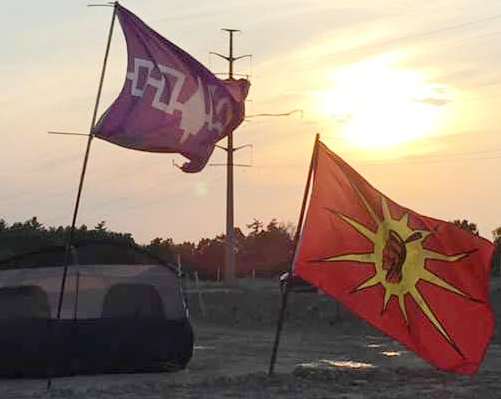 Today, it is legal
under Canadian law for us to hire lawyers and make
land claims. But now, court injunctions allow
those who desire our land to legally swoop in and
take it while we are forced to navigate costly and
lengthy court proceedings. This is hardly
progress. When Haudenosaunee Land Defenders and
our allies are required to defy injunctions to
protect our territories, we are arrested, charged,
and threatened with incarceration. It is still a
crime to fight for our lands, but we are still
fighting. Land defence criminalization is meant to
divide families, nations, and allies, in order to
scare us into submission. Knowing this, Caledonia
mayor Ken Hewitt has publicly applauded the police
for "taking a stand" in arresting and charging our
family for participating in the 1492 land defence.
Hewitt said he looked forward to more arrests of
our family members, and suggested the courts keep
us in jail. Today, it is legal
under Canadian law for us to hire lawyers and make
land claims. But now, court injunctions allow
those who desire our land to legally swoop in and
take it while we are forced to navigate costly and
lengthy court proceedings. This is hardly
progress. When Haudenosaunee Land Defenders and
our allies are required to defy injunctions to
protect our territories, we are arrested, charged,
and threatened with incarceration. It is still a
crime to fight for our lands, but we are still
fighting. Land defence criminalization is meant to
divide families, nations, and allies, in order to
scare us into submission. Knowing this, Caledonia
mayor Ken Hewitt has publicly applauded the police
for "taking a stand" in arresting and charging our
family for participating in the 1492 land defence.
Hewitt said he looked forward to more arrests of
our family members, and suggested the courts keep
us in jail.
This is especially alarming as these comments
from Ken Hewitt come several weeks following the
Haldimand Police Service Board's comments and
recommendation that the OPP re-evaluate their
"Indigenous Critical Incidents Policy"-- crafted
to ensure that there are not Indigenous fatalities
during land disputes. Ken Hewitt made no
condemnation of these very concerning comments
from his Police Service Board.
Our children hear these words and rightly fear
for our safety, and their own. They want the
residents of Caledonia and the people of Canada to
reflect on the impacts of land defence
criminalization on Indigenous families. As the
inheritors of all our collective actions, our
children -- Nora, Lola, and Makiyah -- are
speaking about what they see, and we are
listening. The real attack against our family is
the ongoing assault on Haudenosaunee lands,
culture, and community, and politicians' personal
attacks remind us to seek strength in our
collective struggle for peace.
Kahsenniyo and Skyler
Williams
Nora Williams, 18
My name is Nora Williams, Kahsenniyo and Skyler
are my parents. I'd like to address the recent
comments made by Haldimand County mayor Ken
Hewitt, specifically that he "will continue to
support the OPP in their efforts and applaud them
for taking the stand such as arresting family
members of Skyler Williams." I do not appreciate
being attacked in such a manner. To try and
convince police forces to focus on the partner,
elders and teenage children of a land defence
spokesperson is cowardly. Whether you're simply
trying to force my father's hand, or if you've
simply decided to ignore basic human rights,
either are beyond my understanding. If you're so
desperate for us to behave as "Canadians" and not
care about our land and traditions, what is your
own moral code as a Canadian government official?
Instead of trying to understand, you chose force.
Instead of reason, you chose underhanded and
violent tactics. Instead of basic rights, you
chose to try to expand what power you have in a
shameful attempt to sway OPP officials to target
the elderly and children. Instead of questioning
our right to land, question your own right to
land. These kinds of attacks will not change my
opinions and actions to defend my land and my
traditions.
Lola Williams, 14
My name is Lola Williams -- Skyler Williams is my
Dad. He has been a land defender for as long as I
can remember. Me and my Dad have always been very
close. Our entire family has always been very
close. I am proud of both of my parents. But right
now, after reading the Haldimand Police Services
Board recommendations, and then the mayor Ken
Hewitt applauding the OPP for arresting my Mom,
and encouraging them to go after others in my
family, I'm scared. I'm scared of what this means
for my grandparents, my sisters and me. I go to
school in Caledonia. The OPP have set up right
across the road from my school. These are the
people that shot at my Dad and arrested my Mom
when she was alone. Now I have to see them every
time I look out the window or go to lunch. Every
time I walk out the front doors of the school, I
see all these white men with guns who are being
encouraged to target me and my family. I am so
disappointed that the Mayor of the County that I
go to school in would choose to make such hateful
and dangerous comments to target teenage girls and
my elderly grandparents.
Makiyah Williams, 16
My name is Makiyah, I am the daughter of Skyler
and Kahsenniyo. I am writing this letter because I
would like to address the comments made by
Haldimand County mayor Ken Hewitt. These comments
are wrong and racist. I am an Indigenous youth
from Six Nations. Seeing these racist and awful
comments was troubling and sickening. How is
Caledonia supposed to be represented by someone
who openly targeted my parents, and applauded the
OPP for arresting my Mom? Hewitt is putting our
family in danger, without understanding the
impacts it has on my parents, grandparents,
sisters, and on the generations to come. Tell me
how this is okay.
Being a student in Caledonia means I am at risk
for being targeted and threatened. Any threat to
my family threatens me and my sisters. It is
heartbreaking and saddening to see politicians
cheer when my Mom was arrested for tending to her
Haudenosaunee responsibilities as a Mohawk woman.
Imagine this was your family being targeted: how
would you feel? It's so hard to consistently worry
about what will happen next, to worry for my
sisters' safety. Our people know how this feels,
and our responsibilities will always guide our
actions, even when we are afraid.


This statement is issued on behalf of a group of
Haudenosaunee women who are opposed to the use of
injunctions against our people, who are exercising
our sovereignty over our land.
Haudenosaunee have maintained our distinct
worldview and ceremonial practices despite
generations of colonial violence and violations of
our rights. Our traditions and cultural knowledge
are a sacred inheritance that we have an absolute
right to practice. We have the responsibility to
protect this inheritance for our future
generations. In accordance with our worldview, all
matters regarding land are the responsibility of
the women. As caretakers and stewards of the land,
women play a vital role in governance and
decision-making.
Courts violate and criminalize the rights and
responsibility of our women by preventing us from
fulfilling our responsibilities to the land and
our future generations in accordance with
Haudenosaunee Law.
We must also speak to the emotional and spiritual
harm that these injunctions bring to our people.
Our people should never have to suffer emotional
distress for engaging in traditional laws and
customs and the land should never have to suffer
from the absence of our caretaking. We denounce
this system for sowing violence and disrupting the
peace within our community.
We are rightful title holders, and injunctions
deny us our inherent right to our land.
Injunctions also authorize police violence against
our people. Our sovereignty is inherent while
Canada's perceived authority is a product of
violent colonialism and genocide. Injunctions seek
to make this reality invisible, a tool of the
court to sanction more violence and dispossession.
We oppose the broad use of injunctions that are
meant to stifle our people from seeking justice.
Court decisions which prevent Haudenosaunee people
from engaging in our cultural practices impact all
future generations of Haudenosaunee children.
It is our responsibility to protect the
inheritance of our children and we will fulfill
this commitment.
These matters are complex and we do not believe
this court is the appropriate forum to deliberate
our concerns or resolve our issues. We will
continue to resist the criminalization of our
people and illegitimate development in our
territory. We call on the Crown, our allies, to
stop the use of injunctions against our people.
Background
On July 19, 2020, Haudenosaunee Land Defenders
stopped a housing development within the Haldimand
Tract. The so-called McKenzie Meadows became 1492
Land Back Lane.
 On July 31, 2020,
an interim injunction order was placed on the
camp, instructing all Land Defenders to leave and
allow construction to resume. On July 31, 2020,
an interim injunction order was placed on the
camp, instructing all Land Defenders to leave and
allow construction to resume.
On August 5, 2020, the Ontario Provincial Police
(OPP) enforced the injunction and brought violence
to our community, tasing and shooting rubber
bullets, arresting several people, and forcibly
removing us from our territory.
In response to this violence, community members
blocked roads to ensure ongoing and safe access to
1492 Land Back Lane. Following the OPP
enforcement, our presence was re-established at
the camp later that day.
On August 7, Haldimand County was granted an
injunction meant to clear roads and railways
through our territory and the July 31 interim
injunction granted to the developer was made
permanent. Injunctions regarding the roads and
rail lines are going to be heard in court again on
August 25, 2020 and potentially be made permanent
as well.
Land Defenders at 1492 Land Back Lane demand
respect for our community decisions making and
justice for the illegitimate land development in
our territory.
We call on our allies to continue amplifying
these demands peacefully and safely.

All Eyes on Mi'kma'ki
- Sarah Mullgrave -

November 4, 2020. Members of Pictou Landing First
Nation pick up their tags to participate in the
moderate livelihood lobster fishery.
Mi'kmaw First Nations in Nova Scotia continue to
expand their moderate livelihood lobster fishery.
Chief Andrea Paul of the Pictou Landing First
Nation (PLFN) announced on November 4 that her
community had implemented its plan for such a
fishery. "It was a great day, our fishers were
really happy that we were finally moving ahead
with our plan. So at 9 o'clock they started lining
up to pick up their tags, they're very happy," she
told CBC's Information
Morning Nova Scotia. The PLFN, located on
Nova Scotia's north shore on the Northumberland
Strait, joins the Sipekne'katik First Nation that
began its self-regulated moderate livelihood
lobster fishery on September 17 in St. Mary's Bay
in the southwest of the province, and the Potlotek
First Nation that began its fishery in St. Peter's
Bay on the south shore of Cape Breton on October
1. All three communities are exercising their
rights as enshrined in the Peace and Friendship
Treaties signed in 1760-61 between the Mi'kmaw
people and the British Crown, supported by two
Supreme Court rulings in 1999. The Membertou First
Nation on Cape Breton has also indicated its
intention to exercise its fishing rights in the
near future.
The PLFN has published three documents on its
website detailing how it will be managing its
lobster fishery. The document titled "Netukulimk
Livelihood Fisheries Policy and Protocol,"
explains that "Netukulimk is defined as the use of
the natural bounty provided by the Creator for the
self-support and well-being of the individual and
the community by achieving adequate standards of
community nutrition and economic and spiritual
well-being without jeopardizing the integrity,
diversity or productivity of the 'natural bounty.'
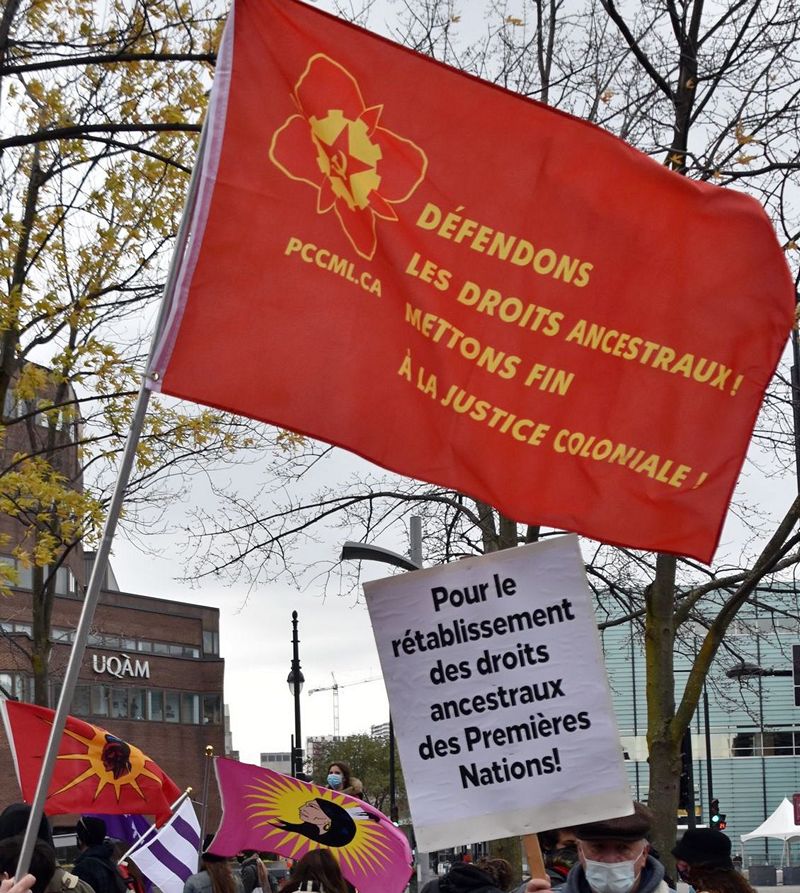 "The principle of
Netukulimk has been the foundation of sustaining
Mi'kmaw families, communities and society since
time immemorial."[1]
It further goes into matters such as the
protection of Treaty Rights, sustainability of the
fishery, economic, social, environmental and
cultural principles, as well as maintaining
peaceful relations with neighbouring communities,
among other considerations, to guide the
fishery. "The principle of
Netukulimk has been the foundation of sustaining
Mi'kmaw families, communities and society since
time immemorial."[1]
It further goes into matters such as the
protection of Treaty Rights, sustainability of the
fishery, economic, social, environmental and
cultural principles, as well as maintaining
peaceful relations with neighbouring communities,
among other considerations, to guide the
fishery.
The document titled "Netukulimk Livelihood
Fisheries Plan" goes into the practical measures
and conditions that PLFN members must be in
conformity with to be authorized by the PLFN to
take part in the fishery, such as registration and
identification, safety requirements, conservation
measures and catch prohibitions, authorized
fishing gear, as well as trap allotment.[2] An appendix to
the plan provides the detailed requirements from
Transport Canada for fishing vessel safety
requirements.[3]
The PLFN authorizes each fisher to use no more
than 30 traps. The PLFN fishery will close from
December 14 to May 1, 2021, the opening day of the
commercial lobster fishing season in that area,
which runs until June 30 with the exception of two
small sections that open in May and end in July.
Contrary to attempts by the Canadian government,
the Department of Fisheries and Oceans (DFO), and
others defending monopoly right to portray the
Mi'kmaw fishers as acting against the well-being
of the fishery and to sow divisions with fishers
who take part in the commercial fishery, reality
shows this is not the case. The considered and
disciplined approach toward the lobster fishery
taken by the Mi'kmaw people and the just exercise
of their sovereignty and treaty rights shows that
they are part of the modern working class on
Turtle Island that all together is striving for
the recognition of rights and to exercise control
over their conditions of life and work.
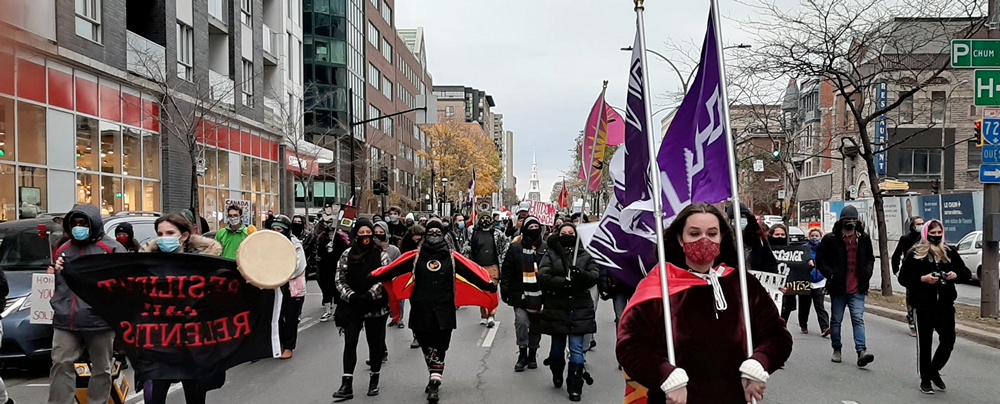

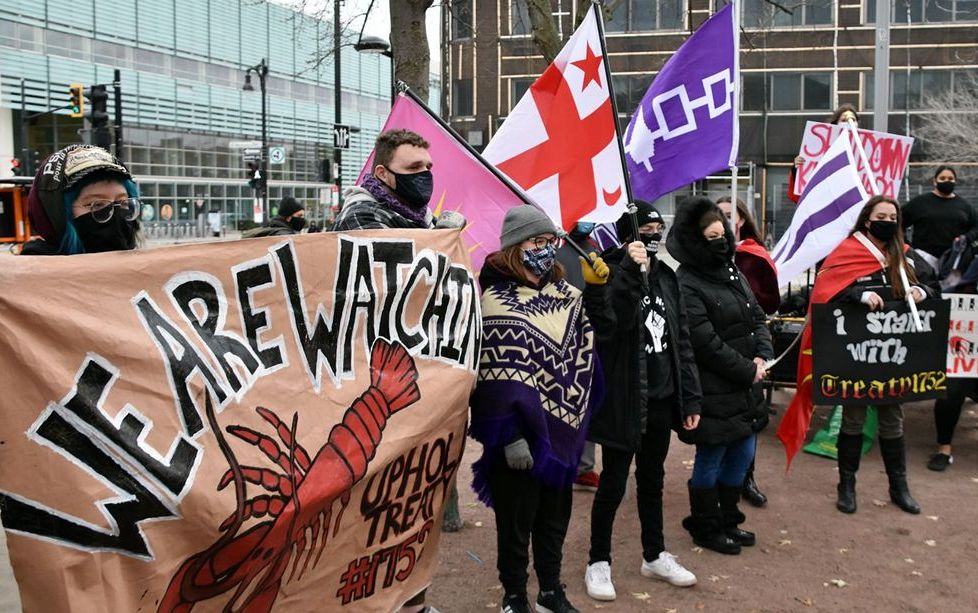 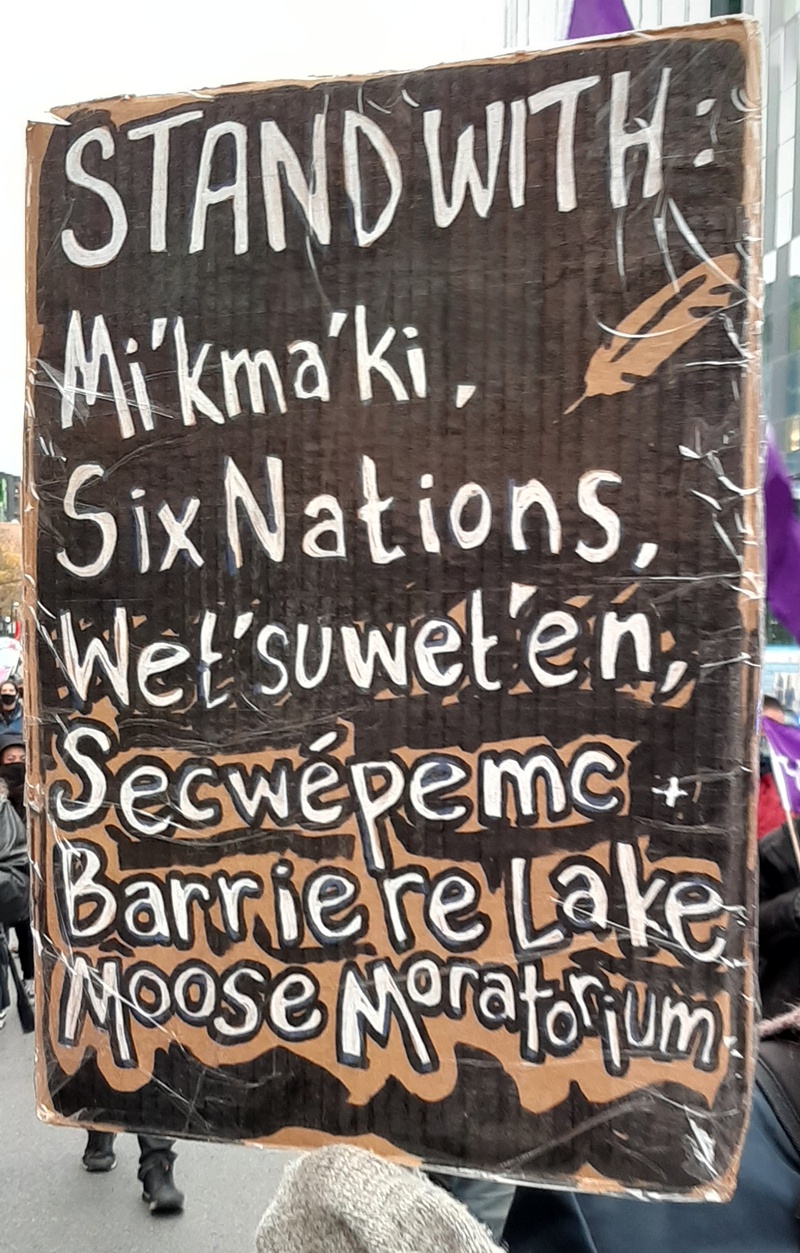
November 1, 2020. "All Eyes on Mi'kma'ki"
demonstration in Montreal.
Ongoing Threat of State Interference
An October 30 press release from the Assembly of
Nova Scotia Mi'kmaw Chiefs titled "DFO Planning
Action to Seize Traps" shows the ongoing threat of
interference from the Canadian state in the
Indigenous fishery. It states:
 "The Assembly of
Nova Scotia Mi'kmaw Chiefs (Assembly) has received
information indicating the Department of Fisheries
and Oceans' Conservation and Protection Department
may be moving in to seize community authorized
gear and traps from the Mi'kmaw Moderate
Livelihood fishery across Nova Scotia. The
Assembly condemns this action and demands all
planned action related to seizure is aborted. "The Assembly of
Nova Scotia Mi'kmaw Chiefs (Assembly) has received
information indicating the Department of Fisheries
and Oceans' Conservation and Protection Department
may be moving in to seize community authorized
gear and traps from the Mi'kmaw Moderate
Livelihood fishery across Nova Scotia. The
Assembly condemns this action and demands all
planned action related to seizure is aborted.
"The Supreme Court of Canada has recognized the
Mi'kmaq Right to fish for a moderate livelihood,
and as also stated publicly by Minister Jordan
herself, this fishery is legal. Therefore, the
Mi'kmaq of Nova Scotia have remained clear, that
we will continue to exercise our treaty right to
fish and sell fish for a moderate livelihood.
"The DFO Conservation and Protection
Department's continued negligence and harassment
of harvesters fishing legally pursuant to their
Treaty Rights is a direct violation of
Constitutional Rights. The Minister of DFO has
also been acting in bad faith during ongoing
Consultations and in a manner inconsistent with
the honour of the Crown.
"The Assembly is gravely concerned for the
well-being and safety of Mi'kmaw harvesters and
they are demanding that the harassment ends
immediately."
It is crucial that everyone continue to stand
with the Mi'kmaq, oppose any interference by the
Canadian state in their fishery and demand that
Canada adhere to its treaty obligations.
Support the Mi'kmaw Fishers in
the Exercise of Their Treaty Rights!
All Eyes on Mi'kma'ki!
Notes
1. Netukulimk
Livelihood
Fisheries, Policy and Protocol, Version 7
(Final), October 2020.
2. Netukulimk
Livelihood Fisheries Plan, Version 7 (Final),
October 2020.
3. Netukulimk
Livelihood Fisheries Harvest Plan, Appendix I,
Version 7 (Final), October 2020.

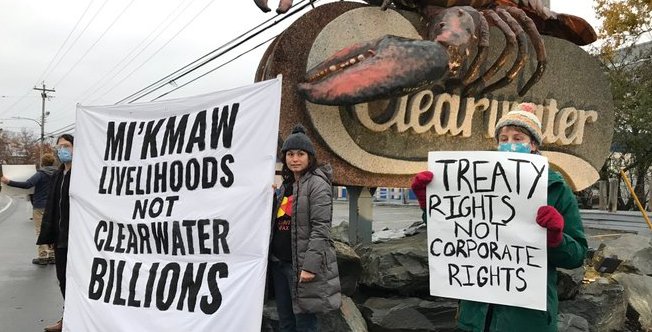
November 5, 2020. Demonstration for moderate
livelihood fishery outside Clearwater facility in
Bedford, prior to the sale.
On November 9, the media announced the sale of
Clearwater Seafoods, the largest private Canadian
seafood monopoly in Atlantic Canada, to a
partnership of Premium Brands Holdings Corporation
based in Vancouver, BC and a group of Mi'kmaw
First Nations led by the Membertou First Nation.
The buyers agreed to pay a purchase price of $1
billion and to assume Clearwater's debts. Each of
the partners will own 50 per cent of the company
which is the largest holder of shellfish licences
and quotas in Canada. According to business
analysis firm Dunn & Bradstreet, Clearwater
Seafood Incorporated has U.S.$539 million in
assets, a net income of U.S.$31.31 million on
U.S.$462.81 million in sales in 2019, and 1,941
employees in total. It holds major offshore rights
to harvest clams, crab, lobster, scallops and
shrimp off the northeastern coast of Canada.
Clearwater Seafood operates its own fleet of
ships, along with offshore and onshore processing
facilities.
Clearwater Seafoods came into existence in 1976.
It was made possible as a result of the Kirby
Report -- Navigating Troubled Waters: A New
Policy of Atlantic Fisheries --
commissioned by the Pierre Elliot Trudeau Liberal
government in 1982, which attacked the livelihoods
of small inshore fishers as a "rural-romantic"
approach to fishing. The Kirby Report justified
the handover of millions of dollars in subsidies
and hundreds of millions in offshore seafood
resources, which rightfully belong to the Mi'kmaq,
the people of Nova Scotia and Canada, to a small
group of private monopolies, including Clearwater
Seafoods, which has become the biggest seafood
monopoly in Atlantic Canada.
Clearwater Seafoods has had the blessing of the
Department of Fisheries and Oceans (DFO) to
self-regulate, make up its own rules, and fish
year-round to maximize profits, while small
independent fishers and the Mi'kmaq are bound by
DFO's rules, regulations and quotas. Currently DFO
officers are seizing and destroying the lobster
traps and nets of Mi'kmaw lobster fishers who are
affirming their sovereign right to trap lobster in
pursuit of a "moderate livelihood."
According to media reports Clearwater has been in
talks with the purchasers for months. A March 2020
press release said: "Clearwater's board of
directors has determined it is timely, prudent and
in the best interests of the company and its
stakeholders to commence the strategic review in
light of the company having recently received
several expressions of interest."
Media reports say the Mi'kmaw coalition will
invest $250 million, financed by a 30-year loan
from the First Nations Finance Authority (FNFA).
The FNFA was created by an act of Parliament in
2005. Its stated purpose is to enable First
Nations to borrow private money through banks and
other lenders at "preferential rates" to finance
infrastructure projects. Since its founding the
FNFA has financed almost $1 billion in loans to
112 First Nations. It is noteworthy that on June
2, the federal government announced that First
Nations with existing loans with the FNFA will
receive "interest payment relief" to the tune of
$17.1 million.
On November 10, the FNFA put out a press release
noting: "FNFA has approved a $250 million loan to
the Mi'kmaq First Nations Coalition to purchase
Clearwater's Canadian offshore fishing licences.
Under the announced agreement, the First Nations
will receive contractual revenues on a quarterly
basis from Clearwater which will have a
significant impact by creating revenue and
boosting their economies."
The sale was announced right in the midst of the
current battle being waged by the Mi'kmaw First
Nations to assert their sovereignty and conduct
their own self-regulated moderate livelihood
lobster fisheries. Chief Terry Paul of the
Membertou First Nation said that the purchase of
Clearwater was "strictly a commercial transaction"
that will not impact the efforts of the Mik'maq to
establish their own self-regulated moderate
livelihood fishery. He described the purchase as
"a generational acquisition that would be felt
across our communities for the next seven
generations."
Just one week earlier, Chief Paul had resigned
from the Assembly of Nova Scotia Mi'kmaw Chiefs,
where he held the Fisheries portfolio for many
years. The CBC reported on October 28 that Chief
Paul said that he could no longer work with the
chief's assembly because the DFO was successfully practising a
divide-and-conquer strategy and undermining the
unity of the Mi'kmaq.
Additionally, the Membertou First Nation recently
bought two of eight lobster-harvesting licences
from Clearwater Seafoods for $25 million. These
licences enable the Membertou First Nation to fish in an
area designated Lobster Fishing Area 41, a vast
area 80 kilometres off the southern tip of Nova
Scotia which has been the exclusive preserve of
Clearwater Seafoods for decades.
Following the announcement of the sale of
Clearwater Seafoods, Dr. Rick Williams, Research
Director for the Canadian Council of Professional
Fish Harvesters and author of A Future for the
Fishery: Crisis and Renewal in Canada's
Neglected Fishing Industry, expressed
concern that the deal could rekindle tensions
between Indigenous and non-Indigenous fishers. He
pointed out to the CBC that "Clearwater has had a
history of conflict with owners of smaller,
family-owned fishing enterprises." He noted that
while the company has pushed for a more
monopolized corporate fisheries model, inshore
fishing groups have urged the federal government
to maintain harvesting in local communities. "Now
that Clearwater is perceived to be a First
Nations-owned company, that adds to the mistrust
about the expansion of Indigenous fisheries. It
will add to fears that a large company can buy up
lobster licences through First Nations that they
weren't able to buy as a company," he said.
From start to finish, the Canadian state bears
responsibility for the destruction of the
livelihoods of the fishers in the Atlantic fishery
and for state-organized violence to deprive the
Mi'kmaq of their hereditary and treaty fishing
rights as sovereign peoples. Financing
partnerships between Indigenous nations and
private interests is both an attempt to extinguish
Indigenous rights and to integrate Indigenous
peoples into the globalized fisheries industry
which has brought nothing but despair to fishers
at home and abroad, and to abrogate the Crown's
fiduciary responsibility to Indigenous peoples'
rights and claims.

(To access articles
individually click on
the black headline.)
PDF
PREVIOUS
ISSUES | HOME
Website: www.cpcml.ca
Email: editor@cpcml.ca
|

